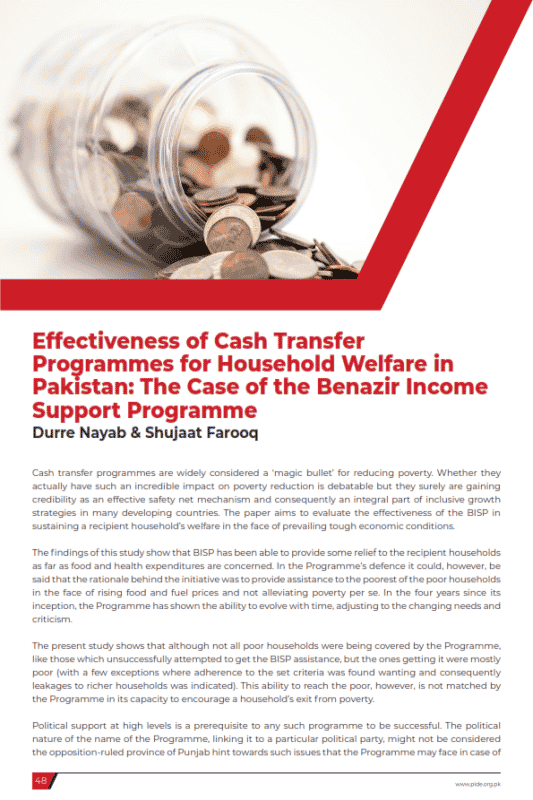Effectiveness of Cash Transfer Programmes for Household Welfare in Pakistan: The Case of the Benazir Income Support Programme (P & R Vol.2 Issue 4)
Cash transfer programmes are widely considered a ‘magic bullet’ for reducing poverty. Whether they actually have such an incredible impact on poverty reduction is debatable but they surely are gaining credibility as an effective safety net mechanism and consequently an integral part of inclusive growth strategies in many developing countries. The paper aims to evaluate the effectiveness of the BISP in sustaining a recipient household’s welfare in the face of prevailing tough economic conditions.
The findings of this study show that BISP has been able to provide some relief to the recipient households as far as food and health expenditures are concerned. In the Programme’s defence it could, however, be said that the rationale behind the initiative was to provide assistance to the poorest of the poor households in the face of rising food and fuel prices and not alleviating poverty per se. In the four years since its inception, the Programme has shown the ability to evolve with time, adjusting to the changing needs and criticism.
The present study shows that although not all poor households were being covered by the Programme, like those which unsuccessfully attempted to get the BISP assistance, but the ones getting it were mostly poor (with a few exceptions where adherence to the set criteria was found wanting and consequently leakages to richer households was indicated). This ability to reach the poor, however, is not matched by the Programme in its capacity to encourage a household’s exit from poverty.
Political support at high levels is a prerequisite to any such programme to be successful. The political nature of the name of the Programme, linking it to a particular political party, might not be considered the opposition-ruled province of Punjab hint towards such issues that the Programme may face in case of desirable to those belonging to other political parties. The slightly lower rates for the BISP beneficiaries in the opposition-ruled province of Punjab hint towards such issues that the Programme may face in case of a political change at the Federal level.
BISP needs to take certain factors into account for the future. Foremost among these is the one related to fostering inter-agency/programme coordination. There is thus a need to streamline all the existing programmes and develop synergies between them for a more effective impact. The BISP with its extensive data gathered for the PMT scores can share the information with other programmes for a more efficient delivery. This would also help counter multiple payments to the same beneficiary under different programmes. A centralised system can also be considered to avoid duplication and for a more stringent application of the eligibility criteria.
Proper monitoring and supervision need to be guaranteed to maintain credibility of the Programme. A well-defined assessment procedure should also be in place to judge the adequacy of the BISP cash transfer. Is the assistance amount sufficient enough to make a reasonable impact on the recipient household’s budget? Another factor ignored by the BISP design at present is the transitory nature of poverty. A household above the poverty line may move below it and vice versa in the face of changing circumstances. The BISP cash transfer should, therefore, take into account not just the poverty status of a household but its dynamics vis-a-vis poverty as well. A recipient household might become ineligible due to poverty dynamics while an ineligible household may become eligible. Such changes need to be taken into account by the BISP design for a more rational and equitable distribution of cash assistance. Last but not the least, the BISP needs to formally incorporate a mechanism for graduation out of poverty. Making a household exit from the poverty trap should be the aim of the Programme instead of continuously handing over cash assistance. Making households economically stable and sustainable should be any social protection programme’s aim and the BISP should be no exception.




